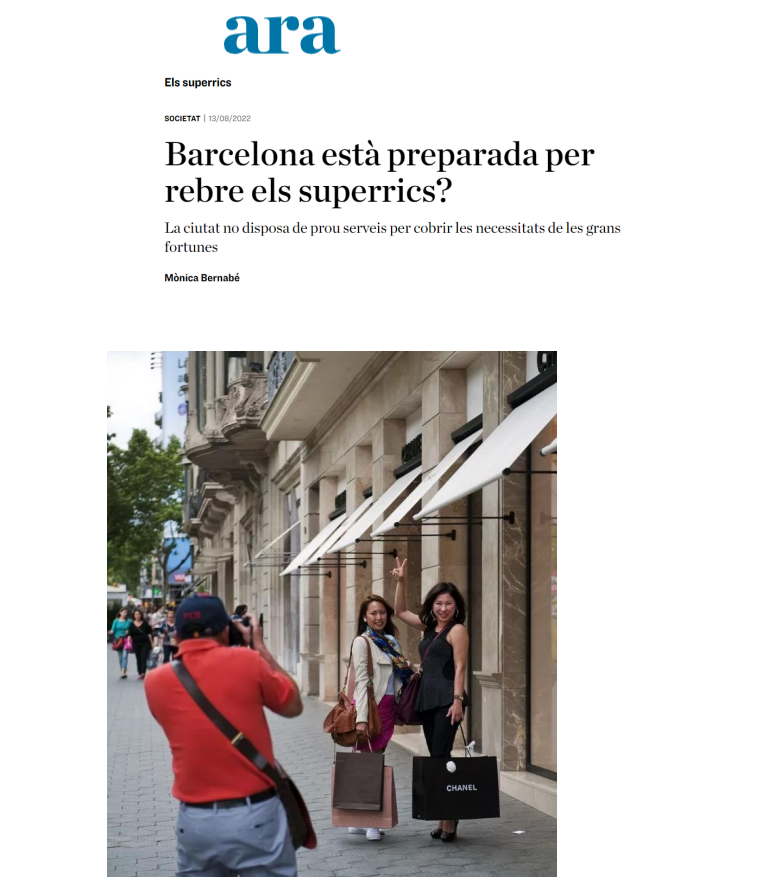
![]() We share with you an article about Alberta LaGrup in Diari Ara!
We share with you an article about Alberta LaGrup in Diari Ara!

Barcelona does not yet offer sufficient services to cover the needs of the very wealthy
Barcelona does not yet offer sufficient services to cover the needs of the very wealthy
BARCELONA
A man dressed in a black blazer, white shirt and tie opens the door for clients and welcomes them to the store. There are two floors. On the first one, an Asian shop assistant serves two young clients who appear to be from South Korea and who are interested in purchasing some scarves. On the second floor, there are a few more clients, also from Asia, who are looking at some lipsticks that are on display while they wait to be served. There are also three women in headscarves waiting, seemingly from the Middle East, as well as another girl, who despite the heat, is wearing some kind of pink slippers – for sure designer ones, otherwise it would not make sense for anyone to be wearing them outside the house. There are also two women taking a rest on the armchairs and who look as though they’ve stepped off a film set: wearing wide-brimmed sunhats and sunglasses, despite there not being much light inside the shop. One of them carries a small, white poodle in her arms. Just like the rest of the clients, they are also waiting.
Although unbelievable, there is a queue for Hermès, one of the most exclusive luxury stores on Passeig de Gràcia in Barcelona. The reason being is that there are people for whom things, quite frankly, are going well, despite the fact that for most people the only remedy is to tighten their belts due to the uncontrollable inflation. These people are the rich and the super rich.
“We have an account in the Las Vegas store”, says one couple who speak Spanish with a Latin American accent, and who want to buy a pair of shoes in Hermès after spending a while trying on a few different pairs. Then there are two girls, with sculpted and tanned bodies who have fallen in love with a tiny white bag that is on display on one of the shelves. The shop assistant puts on a pair of gloves before showing it to them to avoid touching the bag with her bare hands.
A few pairs of shoes, some items of clothing, various accessories and not a whole lot more is what you will find in Hermès. Of course, everything is extremely expensive. For example, a simple beach towel costs 350 euros, a woman’s top costs 850 and a woollen sweater, which is surprising given the time of year, costs 1,300 euros.
Concierge services
“Barcelona is a very attractive city, there really are many business opportunities”, says Lourdes Carbó, who is the founder and director of Alberta La Grup, a Catalan company that is dedicated specifically to helping make the lives of the very wealthy easier. The company offers what is known as Concierge Sevices, and this year it has become one of the most outstanding agencies in the sector, according to a ranking in Spear’s magazine – a publication aimed at assisting the wealthy with the best services in the market: for example, the best whisky suppliers, the best equestrian suppliers, the best financial advisors when buying a yacht or a private plane, the best babysitters to take care of their children…
“If a family wants their child to study in a private university, we take care of the administrative tasks. Or with they want to take their care from one country to another, we take care of that too. Or if they want us to get their smoking jacket ready for the opera, or for us to fill their fridge” are the examples that Carbó gives to explain what exactly it is that she does. The requests they receive could literally be anything, sometimes involving things that are very extravagant. However, they never get involved with anything related to business, finance or legal topics.
The superrich like Barcelona because they can park up their yacht and be in the centre in 15 minutes. They also like the discretion, the gastronomy, the great private health services and the leisure options.
As Carbó says, the superrich really like Barcelona for different reasons: “They can park up their yacht and be in the centre in 15 minutes. They also like the discretion, the gastronomy, the great private health services, the good infrastructure, the leisure, the entertainment and the culture”, she specifies. The problem, as she mentions, is that sometimes the city does not meet the high expectations.
“In Barcelona, it is impossible to rent three Aston Martins in the same week. You can find one, but not three. Or you can go to a luxury store on Passeig de Gràcia and they might not have the whole collection. And that means we lose clients, because if they don’t find what they want, they will get on a plane and go to Milan to buy it”, she gives as an example.
“In Barcelona, we also don’t have good agencies to find babysitters, or the babysitters you find don’t speak English. Or there are services that literally do not exist here: for example, we often get requests for a home for the elderly that is like a five star hotel”. Carbó reminds us that Barcelona is in competition with other top cities such as London, New York and Dubai, where you can find all kinds of services.
“ In Dubai they would even close a shop so that someone can go shopping there”, she says.
In Barcelona, at least at the moment, they don’t tend to close shops for exclusive clients. In fact, in some luxury stores on Passeig de Gràcia, there are even queues in the street to get in. In Gucci, there are so many people just before closing time that one of the shop’s employees to warn the clients that the shop will close in the next half hour and they cannot guarantee that all the clients will have chance to go in. They speak in English, assuming that all of them are from abroad. And they are right – that is the reality.
“Do you already know what you want?” one man asks his wife. “I’m having a look”, she replies whilst taking a look at the Gucci website on her phone. Both of them speak Spanish with a Latin American accent. Once they enter the store, the lady knows what she wants to buy: a small pink bag that costs 2, 650 euros.
Carbó explains that many of her clients are from Venezuela, but she also has clients from Mexico, Colombia, the USA, Germany, Italy… Of course, around 90% of them are from abroad. “These are people that have more than one residency in the world, they usually travel in private jets and they have more than thirty employees working in their homes: butlers, maids, nannies, chauffeurs, personal assistants, security…” Carbó declines to specify what their fortunes are. “Having a yacht is clearly a status symbol as a boat involves constantly spending on maintenance” is the only information she is willing to give.
A port for luxury yachts
In fact, Barcelona has a port destined toward yachts and super yachts: Port Vell Marina, located in the Barceloneta. It has 151 moorings and one of the longest docks in the world, which could attract super yachts of up to 190 metres in length. It is an exclusive area, with private security and to which ARA has not been able to access, despite having requested to do so. The boats moored there belong to members of royal families, directors and CEOs of the most important companies in the world, sources at the Port Vell Marina have told us, without sharing how many of the moorings are currently occupied. “Throughout the year, the Marina hosts around 300 boats”, the same sources tell us, as well as clarifying that the months with the highest occupation are those in “spring and autumn”. Despite there not being so many yachts at the moment, the ones that are there still catch your attention. In fact, it is quite normal to see tourists – the ones that don’t have so much money, of course – taking selfies in front of the port with the yachts in the background.
“If we offered more special services, more wealthy families would come. I’m not suggesting we create a Port Aventura for the rich, but rather that if we want aim for that market, we need to be very well prepared”, says Carbó, who insists that Barcelona has a long way to go in that sense.
One of the new services that is offered in the city is the possibility to buy a luxury apartment that comes with the same services that you would expect at a five star hotel. The Antares tower, located in front of Parc del Fòrum, is one example. It belongs to the Shaftesbury investment fund, but 25% of the apartments have already been sold – all of them to superrich foreigners. The first resident moved in last February. Alberta La Grub is the company that takes care of the services and the director of operations, Thaïs Guerrero, gave ARA a tour of the building.
The tower has 27 floors and 88 luxury apartments. The cheapest one costs 850,000 euros and has a surface area of 115 square metres. The largest one has 795 square metres and the price has not been made public. In any case, the apartments are spectacular, with large windows, views over the sea and huge amounts of space. In some of them, you can even see the Sagrada Familia and Tibidabo from the bathtub, as though it were a viewpoint. They also have a security and cleaning service available, as well as common areas with pools, a gym, a spa… “This kind of residency already existed in Madrid. In that sense, they are more advanced”, says Guerrero.
Barcelona still needs to take a giant leap regarding having staff available that are trained to work for this kind of profile. With this objective in mind, Alberta La Grup also runs courses to train what they call personal angels – also known as personal assistants that help to make the daily lives of the superrich easier. The course, given in English and French, lasts for three and a half months and includes subjects such as household management, managing a macro yacht and organizing family travel. According to Carbó, all the students so far have found a job and are earning generous salaries of between 50,000 and 70,000 euros per year. Perhaps this is the alternative in Barcelona to low cost tourism.
¿Barcelona está preparada para recibir a los superricos?
La ciudad no dispone de suficientes servicios para cubrir las necesidades de las grandes fortunas
BARCELONA
Un hombre con traje de chaqueta negro, camisa blanca y corbata abre solicitando la puerta de entrada a los clientes y les da la bienvenida a la tienda. Hay dos plantas. En la primera, una dependienta de origen asiático atiende a dos jóvenes que parecen surcoreanas y que se interesan por unos pañuelos de cuello. En la segunda, un par de clientas más, también asiáticas, miran los pintalabios expuestos en un mostrador mientras esperan que las atiendan. Un poco más allá también esperan tres mujeres con pañuelo en la cabeza que proceden sin duda de algún país del golfo Pérsico, y una chica de origen indeterminado que, a pesar del calor que hace, lleva una especie de plantofas de pelo de color rosa que deben ser de diseño, porque, si no, no se entiende que alguien salga con eso de casa. En una butaca descansan dos mujeres más que parecen sacadas de una película: llevan pamela y gafas de sol aunque dentro de la tienda no hay mucha luz, y una de ellas tiene en los brazos un caniche de pelo blanco y arriesgado. Como el resto, también se esperan.
Aunque parezca mentira, hay cola en Hermès, una de las tiendas de lujo más exclusivas del paseo de Gràcia de Barcelona. Porque hay gente a la que las cosas le siguen yendo francamente bien, aunque a la mayoría de mortales no les quede más remedio que estrecharse el cinturón por la inflación descontrolada. Son los ricos o superricos.
“Tenemos cuenta de la tienda en Las Vegas”, comenta una pareja que habla español con acento latinoamericano y que se dispone a comprar unos mocasines en Hermès, después de que él haya estado un buen rato emprobándose varios pares. En cambio, dos chicas de cuerpo escultural y bronceado se decantan por un bolso minúsculo de color blanco que hay expuesto en un estante. El dependiente, antes de enseñárselo, se pone unos guantes para no tocar el bolso directamente con las manos.
Unos cuantos zapatos, alguna prenda de vestir, varios accesorios y poca cosa más se puede encontrar en Hermès. Eso sí, todo es extremadamente caro. Por ejemplo, una simple toalla de playa cuesta 350 euros; un top de mujer, 850, y un jersey de lana, que sorprende que lo vendan en esta época del año, 1.300 euros.
Servicios de ‘concierge’
“Barcelona atrae mucho, realmente hay oportunidad de negocio”, asegura Lourdes Carbó, que es fundadora y directora de Alberta La Grup, una empresa catalana que precisamente se dedica a asistir grandes fortunas para hacerles la vida privada un poco más fácil. Es decir, ofrece lo que se llama servicios de concierge, y este año se ha convertido en una de las agencias más destacadas del sector, según un ranking de la revista Spear’s, que es una publicación destinada a asesorar a los ricos sobre los mejores servicios del mercado: por ejemplo, los mejores asesores de whisky, los mejores expertos en equitación, los mejores consejeros financieros para comprar un yate o un avión privado, las mejores niñeras para cuidar a sus hijos…
“Si una familia quiere que su hijo estudie en una universidad privada, nosotros hacemos las gestiones. O si quieren que traslademos un coche de un país a otro, también. O que les preparamos el esmoquin para ir a la ópera, o que les llenemos la nevera”, pone como ejemplos Para explicar a qué se dedican exactamente. Las peticiones que reciben pueden ser de todo tipo, incluso a veces estrambóticas, excepto vinculadas a negocios, finanzas y temas legales, porque estos aspectos no los tocan.
A los superricos les gusta Barcelona porque pueden atracar el yate y en quince minutos estar en el centro de la ciudad, y también por la discreción, la gastronomía, la buena sanidad privada y el ocio.
Y sí, como dice Carbó, Barcelona realmente agrada a los superricos por diferentes razones: “Porque pueden atracar el yate y en quince minutos estar en el centro de la ciudad. Por la discreción, la gastronomía, la buena sanidad privada, las buenas infraestructuras, el ocio, el entretenimiento y la cultura”, detalla. El problema, según asegura, es que a veces la ciudad no está a la altura.
“En Barcelona es imposible alquilar tres Aston Martin en una misma semana. Puedes encontrar uno, pero no tres. O vas a una tienda de lujo del paseo de Gràcia y no tienen toda la colección. Y eso hace que perdamos clientela, porque si no encuentran lo que quieren, cogen un avión y se van a Milán a comprar”, pone como ejemplo. “Tampoco hay buenas agencias para buscar niñeras y las niñeras que encuentras no hablan inglés. O directamente hay servicios que aquí ni existen: por ejemplo, a menudo nos piden una residencia de ancianos que sea como un hotel de cinco estrellas”. Carbó recuerda que Barcelona compite con ciudades de primera liga, como Londres, Nueva York o Dubai, donde sí hay todo tipo de servicios. “En Dubai pueden cerrar una tienda para que alguien vaya a comprar”, afirma.
En Barcelona, de momento, no suelen cerrar establecimientos para clientes exclusivos. De hecho, en otras tiendas de lujo del paseo de Gràcia también se forman colas en la calle. En la de Gucci hay tanta gente a última hora de la tarde que una trabajadora del establecimiento sale al exterior para advertir a los clientes que la tienda cerrará de aquí solo media hora y no puede garantizar que todo el mundo pueda entrar antes. Se dirige a él en inglés, dando por hecho que todos son extranjeros. Y es así, todos lo son.
“¿Ya sabes qué quieres?”, pregunta entonces un hombre a su mujer. “Lo estoy mirando”, responde ella, mientras consulta la web de Gucci en el teléfono móvil. Ambos hablan español con acento latinoamericano. Cuando entran en la tienda, la mujer ya sabe qué quiere comprar: un pequeño bolso de color rosa que vale 2.650 euros.
Carbó explica que muchos de sus clientes son venezolanos, pero también tienen clientes mexicanos, colombianos, norteamericanos, alemanes, italianos… Eso sí, más del 90% son extranjeros. “Se trata de personas que tienen más de una residencia en el mundo, suelen viajar en avión privado y disponen de más de treinta trabajadores [en el hogar] entre mayordomos, criados, niñeras, choferes, asistentes personales, seguridad…” Carbó declina concretar la cuantía de estas fortunas. “Tener un yate es un claro símbolo de estatus, porque un barco supone gastar constantemente dinero en mantenimiento”, se limita a decir.
Un puerto para yates de lujo
De hecho, Barcelona tiene un puerto destinado a yates y superiots: la Marina Port Vell, situada en el barrio de la Barceloneta. Cuenta con 151 amarres y uno de los muelles más largos del mundo donde pueden atracar superiots de hasta 190 metros de eslora. Es una zona exclusiva, con vigilancia privada y a la que el ARA no ha podido acceder a pesar de haberlo solicitado. Los barcos que amarran son “propiedad de miembros de la realeza, directores y CEO de las principales empresas del mundo, así como empresarios de éxito y renombre y personajes conocidos”, han informado fuentes de la Marina Port Vell, que no han precisado cuántos amarres están ocupados actualmente. “A lo largo del año la marina puede albergar hasta 300 embarcaciones”, afirman las mismas fuentes, además de aclarar que los meses de mayor ocupación son los de “primavera y otoño”. Aunque ahora no hay muchos yates, igualmente llaman la atención. De hecho, es habitual ver turistas –los que no tienen tanto dinero, lógicamente– haciéndose selfies ante el puerto con las embarcaciones de fondo.
“Si tuviéramos más servicios especiales, vendrían más familias con poder adquisitivo. No digo que hagamos un Port Aventura para ricos, pero, si nos queremos dirigir a este mercado, nos tenemos que preparar muy bien”, afirma Carbó, que insiste que Barcelona todavía tiene que recorrer un largo camino en este sentido.
Uno de los nuevos servicios que se están ofreciendo en la ciudad es la posibilidad de comprar apartamentos de lujo que tienen las mismas prestaciones que un hotel de cinco estrellas. La torre Antares, situada delante del Parc del Fòrum, es un ejemplo. Es propiedad del fondo de inversión Shaftesbury, pero un 25% de los apartamentos ya han sido vendidos. Todos, a extranjeros superricos. El primer residente se instaló el febrero pasado. La empresa Alberta La Grup se encarga de los servicios y la directora de operaciones, Thaïs Guerrero, se encarga de hacer un tour al ARA por el edificio.
La torre tiene 27 plantas y 88 apartamentos de lujo. El más barato vale 850.000 euros y tiene una superficie de 115 metros cuadrados. El mayor mide 795 metros cuadrados y el precio no se ha hecho público. Sea como fuere, en todos los casos, los pisos son espectaculares, con grandes ventanales, vistas al mar y espacios descomunales. En algunos incluso desde la bañera es posible ver la Sagrada Familia y el Tibidabo como si fuera un mirador. Además, disponen de servicio de mantenimiento, seguridad y limpieza, y espacios comunes con piscinas, gimnasio, spa… “Este tipo de residencias ya existían en Madrid. Allí van más avanzados”, asegura Guerrero.
En lo que todavía hay que dar un paso de gigante en Barcelona es en la disponibilidad de personal que esté preparado para trabajar para estas fortunas. Precisamente con este objetivo, Alberta La Grup también imparte cursos para formar lo que ellos llaman personal angels, es decir, asesores personales que ayuden a los superricos a hacer su día a día más fácil. El curso, impartido en inglés y francés y de tres meses y medio de duración, incluye asignaturas como gestionar una casa, encargarse de un macroiot y organizar viajes familiares. Según Carbó, de momento todos los alumnos han acabado encontrando trabajo y cobran sueldos generosos, entre 50.000 y 70.000 euros al año. Quizás esa es la alternativa en Barcelona al turismo low cost.





